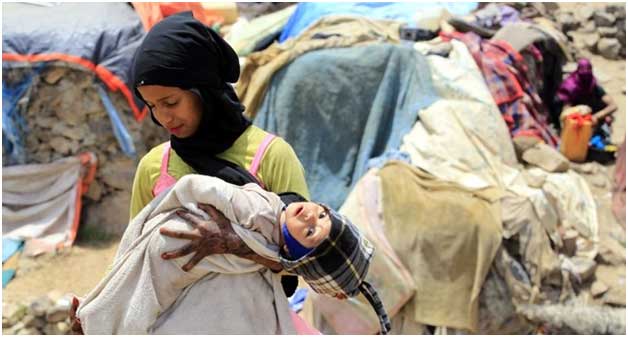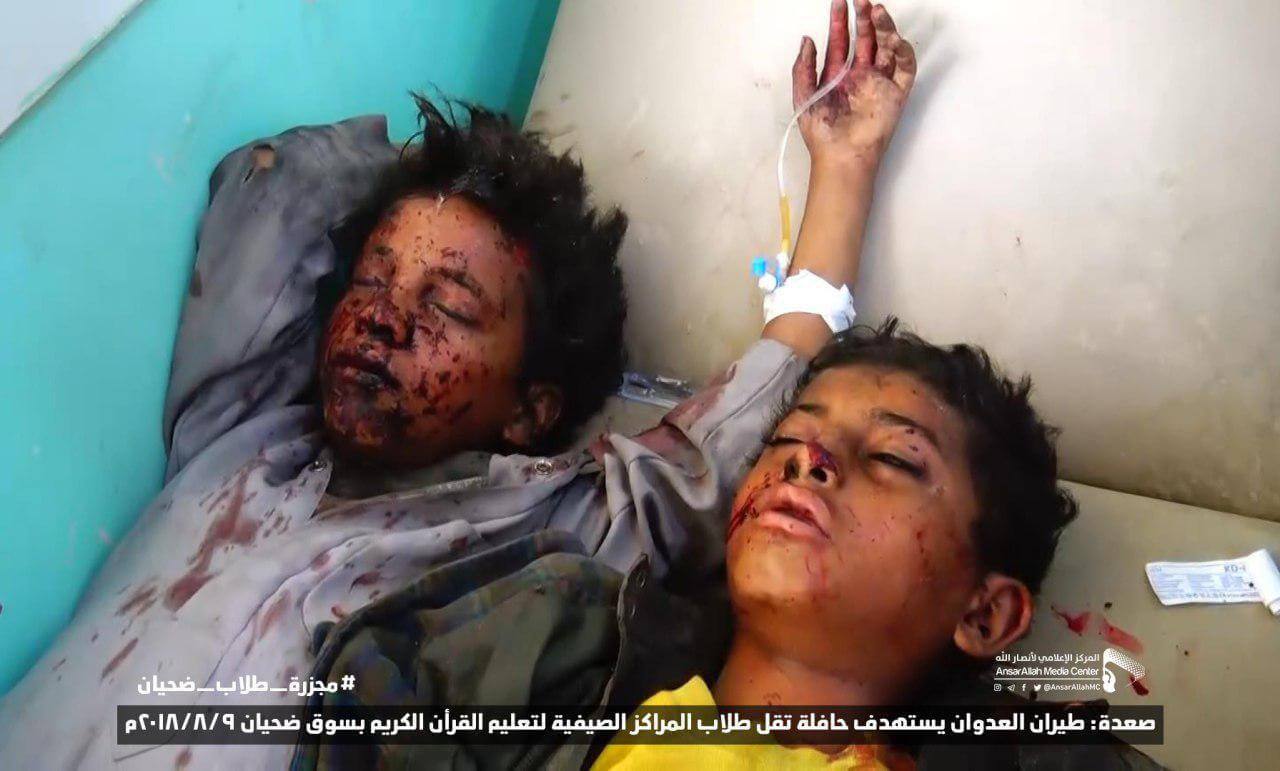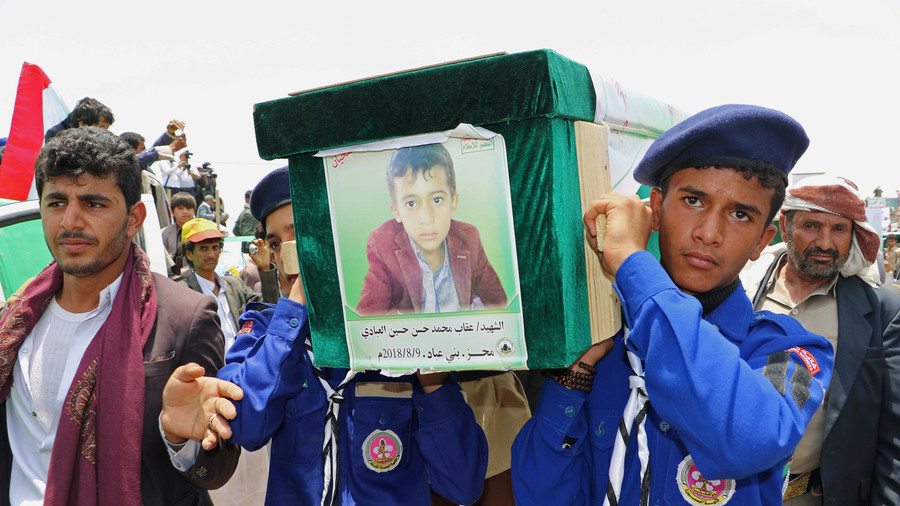
ACTION ALERT: Tell Congress to End the War on Yemen
David Swanson / World BEYOND War
(January 28, 2021) — The US House of Representatives (in February and again in April, 2019) and the Senate (in December 2018 and March 2019) have each voted twice with strong bipartisan majorities to end the war on Yemen (vetoed by then-President Trump in April 2019).
The Democratic Party Platform of 2020 commits to ending the war on Yemen. President Biden’s nominees each say they are ending the war on Yemen. But Congress has yet to act since the veto threat disappeared along with Trump. And every day that the war goes unended means more horrific death and suffering.
Yemen today remains the worst humanitarian crisis in the world, according to the United Nations. Over 4 million people have been displaced because of the war, and 80% of the population, including 12.2 million children, are in desperate need of humanitarian assistance. To add to the already dire situation, Yemen has one of the worst Covid-19 death rates in the world — it kills 1 in 4 people who test positive.
This humanitarian crisis is a direct result of the Western-backed, Saudi-led war and indiscriminate bombing campaign that has raged against Yemen since March 2015, as well as an air, land and sea blockade which prevents desperately-needed goods and aid from reaching the people of Yemen.
UN agencies and humanitarian organizations have repeatedly documented that there is no military solution possible in the current conflict in Yemen. The only thing the constant supply of arms to Yemen does is prolongs hostilities, and increases suffering and numbers of the dead.
Congress needs to re-introduce the War Powers Resolution under a Biden administration.
Congress needs to end weapons shipments to Saudi Arabia and the United Arab Emirates. Click here to email your Representative and Senators to demand that they immediately introduce legislation under the War Powers Resolution to end US participation in the war, directly or indirectly, and end all provision of US weapons to participants in the war.
ACTION: Sign the petition: Urge your Congress members to immediately end US involvement in the war in Yemen!World BEYOND War is a global network of volunteers, activists, and allied organizations advocating for the abolition of the very institution of war. Our success is driven by a people-powered movement — support our work for a culture of peace.
Opt-in for important, timely mobile messages.
World BEYOND War, 513 E Main St #1484 Charlottesville, VA 22902 USA

Yemenis Seek Justice for ‘Unlawful’ US Drone Strike Killings
The Defense Post & Agence France-Presse
(January 29, 2021) — Two Yemeni families have filed a petition this week against the US government over the “unlawful” killing of 34 relatives, including nine children, in counter-terrorism operations, said human rights group Reprieve.
The families suffered enormous loss of life and property between 2013 and 2018 in six drone strikes and a special operations raid, said Reprieve, which submitted the petition to the Inter-American Commission on Human Rights on behalf of the families on Tuesday.
“It is averred that the seven attacks at issue have resulted in the unlawful killing of at least 48 people, including 17 children, and in the serious injury of at least seven others, as well as the destruction of their personal property and livelihoods,” said the petition seen by AFP.
Of those killed, 34 were members of the Al-Ameriand Al-Taisyfamilies, who are requesting the commission urge the US government to take immediate measures to prevent further harm as it reviews the files — often a long process that could take years.
The first strike, which took place in December 2013 under the administration of then-president Barack Obama, targeted a wedding procession convoy, killing at least 12 people, including seven Al-Ameri family members and five people from the Al-Taisy family, according to the filing.
A local security official at the time told AFP some of the dead were suspected members of Al-Qaeda. The Al-Ameri and Al-Taisy families deny any connection to the jihadist group.
The petition comes just days after US President Joe Bidentook office and it puts the spotlight on America’s long-running bombing campaign against Al-Qaeda in the Arabian Peninsula (AQAP), on which the US rarely comments.
‘Last Resort’
According to analysts, AQAP’s capabilities on the ground have largely diminished over the past decade, apart from a brief uptick of activity amid the ongoing war between the internationally recognized Yemeni government and Iran-aligned Houthi rebels that broke out in 2014.
Since the 2013 convoy incident, six other operations were carried out, all under Biden’s predecessor Donald Trump, during whose administration the US stepped up its campaign in Yemen, according to US Central Command (CENTCOM) data published by US media.
“What the families are hoping for from the commission is first and foremost recognition of the harm that’s been done to them,” Jennifer Gibson, a lawyer with Reprieve, told AFP on Thursday.
“They’ve tried time and time again to engage the Yemeni and US governments to stop the strikes, and yet they’ve continued,” she said. “The commission, for them, is a last resort to try to put forward evidence to say ‘you’re making a mistake, whatever you think it is we’ve done, we’ve not done, please stop the strikes’.”
The Biden administration signaled on Wednesday a fresh look at US policy in the Middle East.
US Secretary of State Antony Blinkensaid that his top priorities would include addressing the catastrophe for civilians in Yemen, where US ally Saudi Arabia has been bombarding Houthi rebels.

The State Department said it was temporarily pausing arms sales authorized by Trump, including munitions to Saudi Arabia and a $23 billion package of cutting-edge F-35 jets to the United Arab Emirates.
“DAY OF JUDGMENT”: The Role of the US and Europe in Civilian Death, Destruction, and Trauma in Yemen
University Network for Human Rights
“The situation was tragic. Body parts were everywhere. It was like the Day of Judgment.” — Fadhl Al-Musabi, survivor of attack in Bani Qais District, Hajjah Governorate (April 22, 2018)
“I was still awake. I was sitting in a chair because I was afraid of the planes flying overhead and making a very loud noise. Then they dropped a bomb near us and afterwards they hit our neighborhood with three bombs. After that I lost consciousness.” – Ahmad Mansour, 10 years old, wounded in Midi District, Hajjah Governorate (December 12, 2016)
Since March 26, 2015, Saudi Arabia and the United Arab Emirates (UAE) have led a coalition of countries in a military campaign against Ansar Allah (Houthi) rebels in Yemen. As documented by multiple human rights organizations as well as the UN, the Saudi/UAE-led Coalition has consistently attacked civilians and critical civilian infrastructure—including hospitals, schools, school children, weddings, farms, and water wells—in violation of the laws of war.
The Coalition has also imposed a naval blockade on major ports in Houthi-controlled areas, obstructing imports of vital food and medical supplies to the war-ravaged country. In areas of Yemen under their control, Coalition forces have engaged in other human rights violations, including widespread arbitrary detention. [1]
The Houthi armed group, which took over the capital city of Sana’a by force in late 2014 and then expanded its control to much of the country, has also violated the laws of war, including by indiscriminately shelling civilians, laying antipersonnel landmines, impeding humanitarian supplies, arbitrarily detaining individuals, committing acts of torture, and conscripting child soldiers. [2]
Four years into the conflict, around 20,000 Yemeni civilians have been killed or wounded and half the population—14 million people—are at risk of famine, according to the UN. [3] Other estimates, however, range much higher: ACLED has recorded over 50,000 reported deaths as a direct result of the fighting, [4] and according to Save the Children, 85,000 children may have died of hunger and preventable disease. [5]
Although happening thousands of miles from United States shores and hundreds of miles from Europe, the war in Yemen is closer to home than it might seem. Indeed, the US and UK actively enable the unlawful bombings of Yemeni civilians by Saudi/UAE-led Coalition forces. For decades, the US has provided Saudi Arabia and the UAE with arms and military training. Despite years of credible reporting on Coalition abuses in Yemen—and in blatant contravention of US arms trade law and international law, as this report details—the US continues to sell Saudi Arabia and the UAE weapons for use in Yemen.
The US military has also provided the Coalition with intelligence, logistical support, targeting assistance, and training. This assistance has continued for years without the Congressional authorization required by US law. The UK, too, continues to sell Coalition countries arms for use in Yemen in direct violation of its obligations under the Arms Trade Treaty and EU Common Position on military exports.

Young victims of the deadly school bus strike.
On August 9, 2018, the Saudi/UAE-led Coalition struck a school bus, killing dozens of children. [6] CNN identified the weapon used as a US-made Mk-82 bomb manufactured by Lockheed Martin. [7] The school bus attack and widespread outrage in the US prodded many members of Congress to act, and rightly so. This report demonstrates a pattern of deadly Coalition attacks involving US weapons since the start of the conflict—a pattern that warrants swift and determined action by Congress.
Of the twenty-seven Saudi/UAE-led Coalition attacks documented in this report, weapons remnants indicating that a US-made weapon was likely involved were found in twenty-five cases and weapons remnants indicating that a UK-made weapon was likely involved were found in five cases. [8] The suspension lug for a US-made bomb used in one of the attacks was produced in Italy.
These twenty-seven Coalition airstrikes include sixteen attacks on civilian gatherings, civilian homes, and a civilian boat; five attacks on educational and health facilities; five attacks on civilian businesses; and an attack on a government cultural center. The twenty-seven attacks killed at least 203 people and injured at least 749. At least 122 children and at least 56 women were among the dead and wounded.
Many of the attacks appeared to take place far from any potential military target. Others caused harm to civilians that vastly outweighed any likely military benefit. In no case did it appear that Coalition forces took adequate precautions to minimize harm to civilians, as required by international humanitarian law.
Victims and survivors of these Coalition attacks often likened the devastation of the airstrikes to the “Day of Judgment.” In an April 2018 Coalition attack in Hajjah Governorate, a joyous wedding celebration quickly turned tragic when a US-made bomb exploded, killing at least twenty-one and injuring at least ninety-seven drummers, dancers, and wedding guests, including nearly sixty children.
In a December 2016 attack on a civilian home, also in Hajjah Governorate, a US-made cluster bomb indiscriminately killed at least fifteen civilians—nine of them children — and wounded at least seven. 10-year-old Ahmad Mansour (quoted above) lost his mother and siblings in the attack, in addition to suffering extensive shrapnel injuries himself. These Saudi/UAE-led Coalition attacks demonstrate the manner in which the Coalition has conducted its campaign in Yemen, often with the assistance of US weapons.
The US-made munitions likely used in twenty-five attacks documented in this report include cluster bombs banned by international treaty due to their indiscriminate effects, Mark 80 series general purpose bombs, Paveway-series precision guided bombs, and bombs with the JDAM guidance system. All of these explosive weapons have wide-area effects and result in foreseeable civilian harm when used in populated areas.
The UK-made munitions likely used in five attacks documented in this report—including Paveway IV and “Hakim” precision guided bombs—damaged or destroyed several civilian businesses as well as an educational facility.
In recent weeks and months, as civilian casualties in Yemen have climbed and as the UN has warned of “the worst famine in the world in 100 years,” a number of European governments—including Germany, Denmark, the Netherlands, Finland, Austria, Belgium, Switzerland, and Norway—have taken measures to prevent arms exports for use in Yemen. [9]
In the US, Congress appears closer than ever to taking meaningful action. Many members of Congress have committed to opposing future arms sales to Saudi Arabia and the UAE. On February 13, 2019, the House of Representatives passed a historic resolution to rescind US military support for the Coalition’s ongoing campaign in Yemen. The Senate is expected to vote on a parallel resolution in the next month.
Our findings reinforce prior evidence demonstrating that the Saudi/UAE-led Coalition is failing to fulfill its obligations under the laws of war and repeatedly using US weapons in apparently disproportionate and indiscriminate attacks that have resulted in widespread civilian casualties and other civilian harm in Yemen.

Time is of the essence. Millions of Yemenis are on the brink of starvation. Unlawful attacks continue, as the civilian toll of the conflict rises. A UN-brokered peace process may be on the brink of collapse. [10]
The US Senate must not delay in demanding an immediate end to US involvement in a brutal campaign that has brought death, destruction, and humanitarian catastrophe to the poorest country in the region.
It is a moral and legal imperative for the US and remaining European states supplying Saudi Arabia, the UAE, and other Coalition countries with weapons for use in Yemen to halt these transfers immediately.
Many lives depend on swift action by the United States and European governments.
READ FULL REPORT (DESIGNED VERSION) HERE
READ FULL REPORT (NON-DESIGNED VERSION) HERE
Footnotes
[1] Human Rights Council, 39th Session, Situation of Human Rights in Yemen, Including Violations and Abuses since September 2014, Report of the United Nations High Commissioner for Human Rights Containing the Findings of the Group of Independent Eminent International and Regional Experts and a Summary of Technical Assistance Provided by the Office of the High Commissioner to the National Commission of Inquiry, U.N. Doc. A/HRC/39/43 (Aug. 17, 2018).
[2] Mwatana for Human Rights et al., Submission to the United Nations Universal Periodic Review of Yemen, Third Cycle, Human Rights Council, 32nd Session, Jan.-Feb. 2019 (July 11, 2018), http://mwatana.org/wp-content/uploads/2018/10/UNIVERSAL-PERIODIC-REVIEW-OF-YEMEN-2.pdf. See also, Mwatana for Human Rights, Woes of “Arabia Felix”: Situation of Human Rights in Yemen 2017 (May 15, 2018), http://mwatana.org/wp-content/uploads/2018/08/The-Woes-of-Arabia-Felix-English-Version-1.pdf; Mwatana for Human Rights, Press in Yemen Faces Extinction (June 2017), http://mwatana.org/wp-content/uploads/2017/10/Press-report-En.pdf; Mwatana for Human Rights, Concealed Killer: Fall of Civilians by the Landmines Laid by the Ansar Allah Armed Forces (the Houthis) and Saleh Forces (Apr. 2017), http://mwatana.org/wp-content/uploads/2017/10/Concealed-Killer-Report-En.pdf; Mwatana for Human Rights, Chapters from Hell: Violations of the International Humanitarian Law in the Armed Ground Conflict in Taiz (Nov. 2016), http://mwatana.org/wp-content/uploads/2018/08/Chapter-from-hell.pdf; Mwatana for Human Rights, They are Not Here: Incidents of Arbirtrary Detention and Enforced Disappearance under the Defacto Authority of the Houthi Armed Group in Yemen (May 2016), http://mwatana.org/wp-content/uploads/2017/10/They-are-not-here-E_2.pdf.
[3] UN Office of the High Commissioner for Human Rights, Bachelet Urges States with The Power and Influence to End Starvation, Killing of Civilians in Yemen (Nov. 10, 2018), https://www.ohchr.org/EN/NEWSEVENTS/PAGES/DISPLAYNEWS.ASPX?NEWSID=23855&LANGID=E.
[4] Armed Conflict Location & Event Data Project, ACLED Methodology and Coding Decisions around the Yemen Civil War 4 (Oct. 2018), https://www.acleddata.com/wp-content/uploads/dlm_uploads/2018/10/Coding-of-YemenCivilWar_Final.pdf.
[5] Save the Children, Yemen: 85,000 Children May Have Died from Starvation Since Start of War (Nov. 20, 2018), https://www.savethechildren.org/us/about-us/media-and-news/2018-press-releases/yemen-85000-children-may-have-died-from-starvation.
[6] Human Rights Watch, Yemen: Coalition Bus Bombing Apparent War Crime (Sept. 2, 2018), https://www.hrw.org/news/2018/09/02/yemen-coalition-bus-bombing-apparent-war-crime.
[7] Nima Elbagir et al., Bomb that Killed 40 Children in Yemen was Supplied by the US, CNN (Aug. 17, 2018), https://www.cnn.com/2018/08/17/middleeast/us-saudi-yemen-bus-strike-intl/index.html. Based on its rigorous methodology, Mwatana could not positively identify the bomb used in the school bus attack.
[8] Three of the twenty-seven attacks documented in this report likely involved weapons with parts produced in both the US and UK.
[9] Jon Stone, Germany, Denmark, Netherlands and Finland Stop Weapons Sales to Saudi Arabia in Response to Yemen Famine, Independent (Nov. 23, 2018), https://www.independent.co.uk/news/world/europe/saudi-arabia-arms-embargo-weapons-europe-germany-denmark-uk-yemen-war-famine-a8648611.html.
[10] Patrick Wintour, Yemen ceasefire: new UN resolution seeks to save agreement, Guardian (Jan. 16, 2019), https://www.theguardian.com/world/2019/jan/16/yemen-ceasefire-un-urgently-tries-to-prevent-collapse-of-agreement.
Posted in accordance with Title 17, Section 107, US Code, for noncommercial, educational purposes.